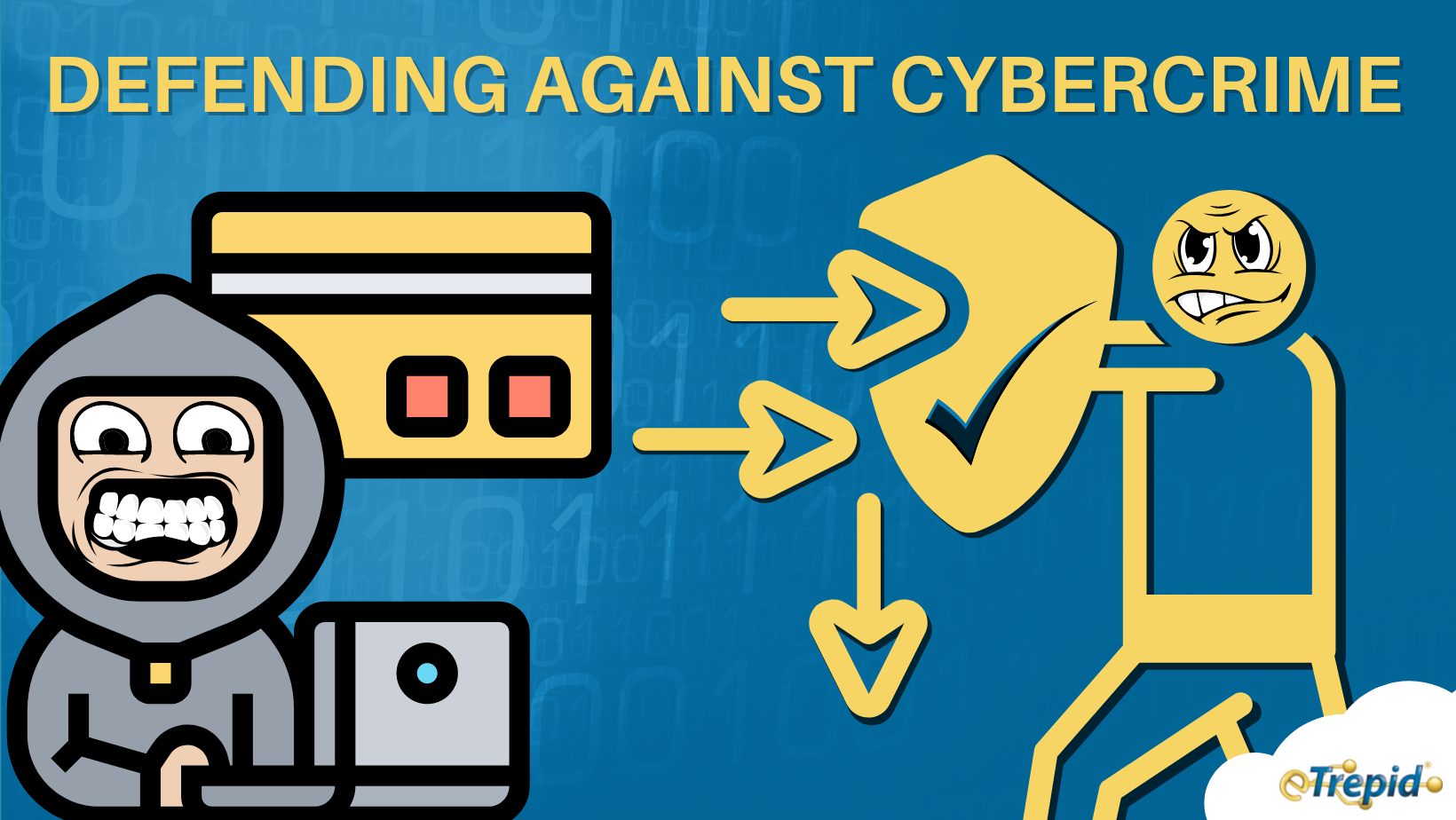Defending Your SMB Against Cybercrime
As we move closer to 2022, small businesses are beginning to invest heavily in cybersecurity training and awareness programs– and that's excellent news. Among those implementing solutions for combating cybercrime and preventing breaches in 2021, many report powerful and positive impacts from training and awareness programs carrying them through today. Companies should implement basic security best practices and enforce standard procedures in protecting sensitive business information to mitigate the risk.

Defending Your Small-Medium Business Against Cybercrime
It's no secret that the modern digital business landscape is rife with danger. Cyberattacks are on the rise, and cybercriminals seize every opportunity to create havoc in a world still navigating a worldwide pandemic.
Indeed, everyone remembers the cycle of headlines over the last year. The media hyper-focused on current attacks before moving on to another episode of Cybercrime flavor of the week.
According to the 2021 cybersecurity report, "State of Cybersecurity 2021 Part II," 23 percent of organizations reported heightened cyber activity during the COVID-19 disruption. The same report goes on to say the 2021 top five cyber attack types are:
- Social engineering (14%)
- Advanced persistent threats (10%)
- Ransomware (9%)
- Unpatched systems (8%)
- DDoS attacks (8%)
One thing is for sure, cybercrime is here to stay and a part of our daily national discourse.
Do you remember? The most recent Colonial Pipeline ransomware attack in April that resulted in fuel shortages was carried out by a group called DarkSide, a 'lock-up crew' that purchases access to systems already breached by other crews specializing in securing entry to sensitive networks.
Despite all the attention breaches get today, the threat landscape of cyberattacks on U.S. businesses has not decreased. In fact, the threat against SMBs has continued to grow. While high-profile attacks against larger organizations generate the most headlines, the truth is that Small-medium businesses (SMBs) bear the brunt of cybercrime aggression. SMBs often lack the cybersecurity resources that larger organizations rely on to protect their assets or respond to threats, and digital criminals are acutely aware of this.
That makes SMBs the preferred targets for electronic criminal assault.
What Can You Do?
The U.S. Small Business Administration (SBA) recommends a stalwart cybersecurity defense plan for all businesses, integrating best practices with dedicated IT support services to help secure an organization as much as possible. Developing a defense strategy can seem like a daunting task at first, but with the proper knowledge and guidance, SMBs can rest assured that vital assets are safe and get back to what they do best – growing their business.
The first step is to make cybersecurity a top priority for your organization. Trying to cut costs by skimping on cyber-defense budgets will cost you significantly more than any cost savings realized in the event of a breach. Often SMBs lack the financial resources to maintain dedicated IT personnel on staff, so outsourcing protection needs to a strong cybersecurity defense team for a low monthly investment always proves cost-effective.
Step-by-Step: How to Defend Yourself
Defending your business from cyber-attacks begins with research and risk assessment. Business owners need to know the different types of threats to look for, learn how criminals can breach business systems, and thoroughly investigate their own operations to identify vulnerabilities.
- Know Thine Enemy: How Cybercriminals Infiltrate a Business
The methods used by cybercriminals are constantly evolving, here are some of the most common:
Malware – Malware is a blanket term that refers to any software program designed to have malicious effects once deployed. Criminals weaponize the programs for various purposes, such as data mining, keystroke spying, or digital theft. Malware is typically attached to executable files that seem safe or inadvertently downloaded from untrustworthy websites. Malware is often designed to remain hidden after activation, giving criminals continuous unauthorized access to compromised business systems.
Ransomware – A specific type of malware, ransomware is designed to seize control of infected business systems for extortion. Compromised businesses lose power and authority over their digital assets, completely halting normal operations. Victims are contacted by criminal groups who then demand exorbitant sums to release business systems back to their rightful owners.
Did you know? While the average ransomware amount was around $200,000 in 2020, the world record for the largest ransomware ever paid came in at a staggering $40 million just this year.
Phishing – Phishing is a technique commonly used by hackers to gain access to vulnerable businesses to deploy malware. As the financial return for cybercriminals has continued to increase, the rise of criminal groups specializing solely in system infiltration has skyrocketed. After unauthorized access has been secured, these groups will then sell that access to other illicit actors. Phishing can take many forms but is most commonly disguised as legitimate emails from trusted business entities.
Social Engineering – Another tactic utilized by cybersecurity infiltration groups is Social Engineering, in which criminals seek to trick and manipulate authorized users into following malicious instructions. Used in conjunction with phishing techniques, social engineering attacks will typically come from criminals disguising themselves as trustworthy sources. Hackers rely on emotional appeals to dupe victims into following links and entering information, often taking the form of emails or phone calls that notify a victim of a fake security breach or falsely stating there is impending legal action against them.
- Identifying Vulnerabilities
The next step in defending your SMB against cybercrime is one of the most important. Risk assessments are critical for identifying vulnerabilities and working to secure them before a breach occurs. This process should be completed by a cybersecurity team that knows the methods used by hackers to infiltrate business systems. Even if maintaining dedicated cybersecurity IT staff is beyond the financial means of your SMB, you can outsource the risk assessment process to experienced cybersecurity firms for a low one-time fee.
Risk assessments will commonly look for vulnerabilities in business networks, investigating procedures for authorizing user access, remote connectivity, data security, information transfers, and business communications.
- Does your business use a single password system to authorize user access?
- Does your company maintain off-premises data backups?
- Does your business rely on wi-fi networks for user access?
Cybersecurity risk assessment experts live to investigate, identify, and prioritize your company's vulnerabilities so together you can develop an effective plan to minimize risks.
- Developing a Plan
After methodically discovering your business vulnerabilities, you can begin to develop an effective cybersecurity plan to tighten them up. The level of risk should prioritize vulnerabilities, and you should implement strategies accordingly. At this phase of cybersecurity development, IT defense professionals typically focus on the following areas:
- How people and systems can better identify threats
- Protocols for containing threats
- How people and systems can more effectively eliminate threats
Team member training is the most important part of plan implementation. If staff lack a general awareness of identifying a phishing email, maintaining remote security, or responding to a breach, then even the most carefully planned security strategies will have critical gaps.
By routinely testing and refreshing team members' cybersecurity knowledge, executing mock breach scenarios, and continuously working with experts to grow security measures, you are more prepared for the evolving and sophisticated cyberattack techniques used today.
The most effective thing you can do to defend your business against cybercrime is to partner with industry security specialists who have the expertise and experience to have your back and keep you secure.


.png)
Leave A Comment